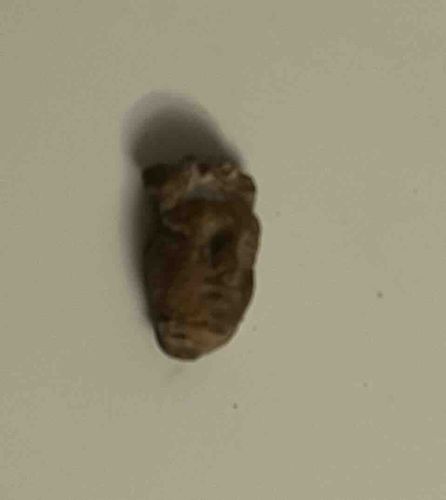
Possible Fossilized Animal Foot Fragment
The item appears to be a small, brown, irregularly shaped object, approximating 1 inch in length and 0.5 inches in width, suggesting it may be a fossilized fragment. Its coloration is predominantly a mottled dark brown to reddish-brown, consistent with mineral staining or the natural color of petrified organic material. The texture appears rough and uneven, with various ridges, grooves, and depressions visible across its surface, indicative of a natural, unworked form. One end of the object exhibits a more defined, somewhat rounded shape with what could be interpreted as subtle contours resembling toes or digits, leading to the speculation of it being a fossilized foot or paw fragment. The opposite end tapers slightly and is less defined. There are no discernible manufacturing details such as maker's marks, signatures, or stamps, which is expected for a natural or fossilized item. The age is most likely ancient or prehistoric, given its fossilized appearance. The overall condition suggests a brittle nature, inherent to fossilization, though no significant cracks or breaks are immediately apparent from the image. Its unique aspect is the strong resemblance to a small animal's foot or paw, making it a compelling specimen for paleontological or natural history collections. The craftsmanship, in this case, is natural formation and fossilization processes.
AI-Generated Appraisal Disclaimer
Estimated Value
$40-70
Basic Information
Category
Fossilized Remains
Appraised On
February 28, 2026
Estimated Value
$40-70
Additional Details Provided By Owner
User Provided Information
Approximately 1 in x 1/2 in
Item Description
The item appears to be a small, brown, irregularly shaped object, approximating 1 inch in length and 0.5 inches in width, suggesting it may be a fossilized fragment. Its coloration is predominantly a mottled dark brown to reddish-brown, consistent with mineral staining or the natural color of petrified organic material. The texture appears rough and uneven, with various ridges, grooves, and depressions visible across its surface, indicative of a natural, unworked form. One end of the object exhibits a more defined, somewhat rounded shape with what could be interpreted as subtle contours resembling toes or digits, leading to the speculation of it being a fossilized foot or paw fragment. The opposite end tapers slightly and is less defined. There are no discernible manufacturing details such as maker's marks, signatures, or stamps, which is expected for a natural or fossilized item. The age is most likely ancient or prehistoric, given its fossilized appearance. The overall condition suggests a brittle nature, inherent to fossilization, though no significant cracks or breaks are immediately apparent from the image. Its unique aspect is the strong resemblance to a small animal's foot or paw, making it a compelling specimen for paleontological or natural history collections. The craftsmanship, in this case, is natural formation and fossilization processes.
Related Tags
Get Your Items Appraised
Instant estimates of your treasures with AI-powered instant appraisals